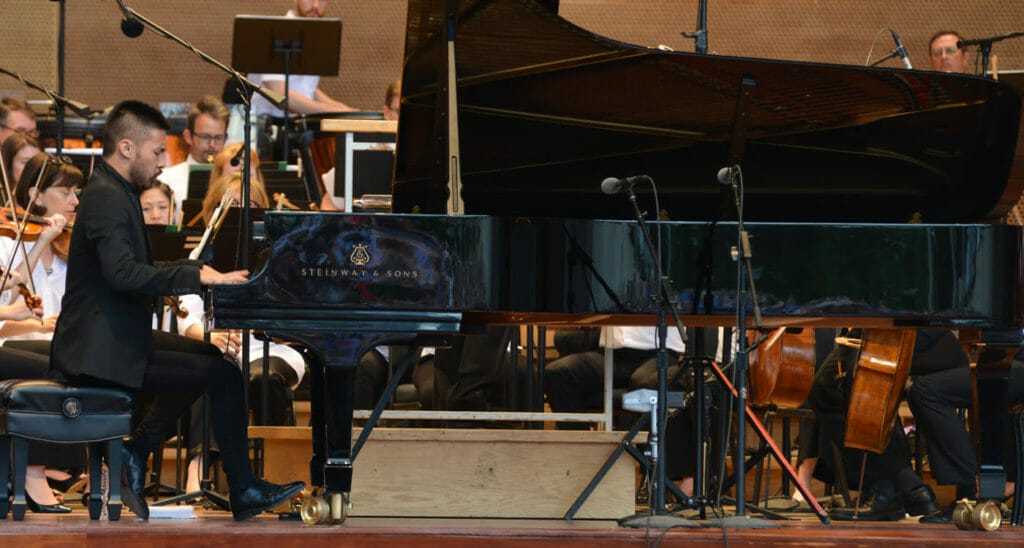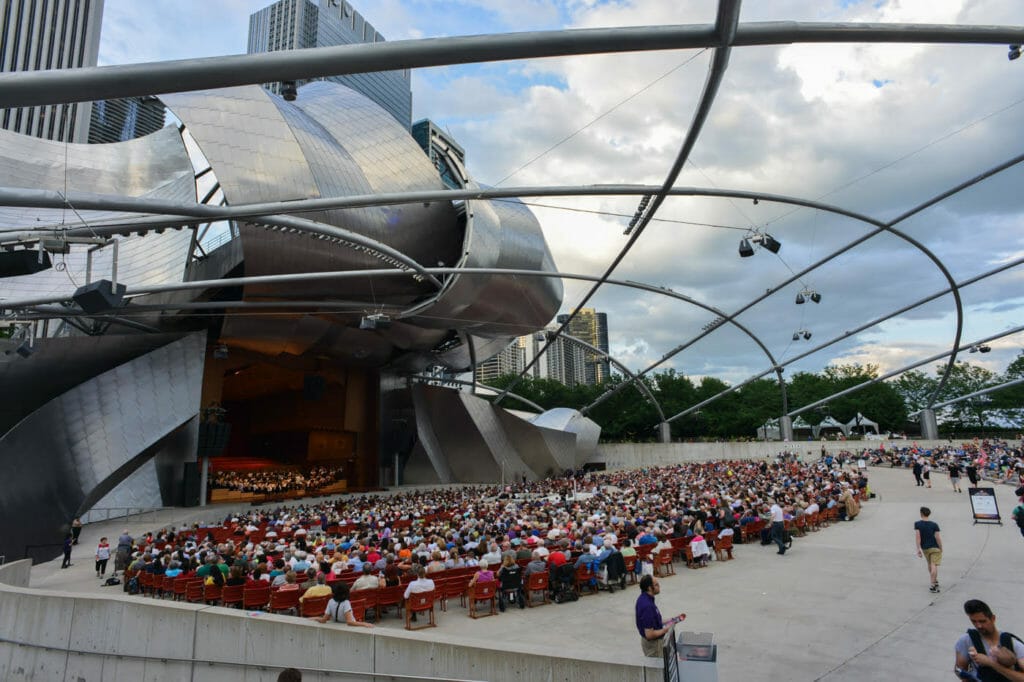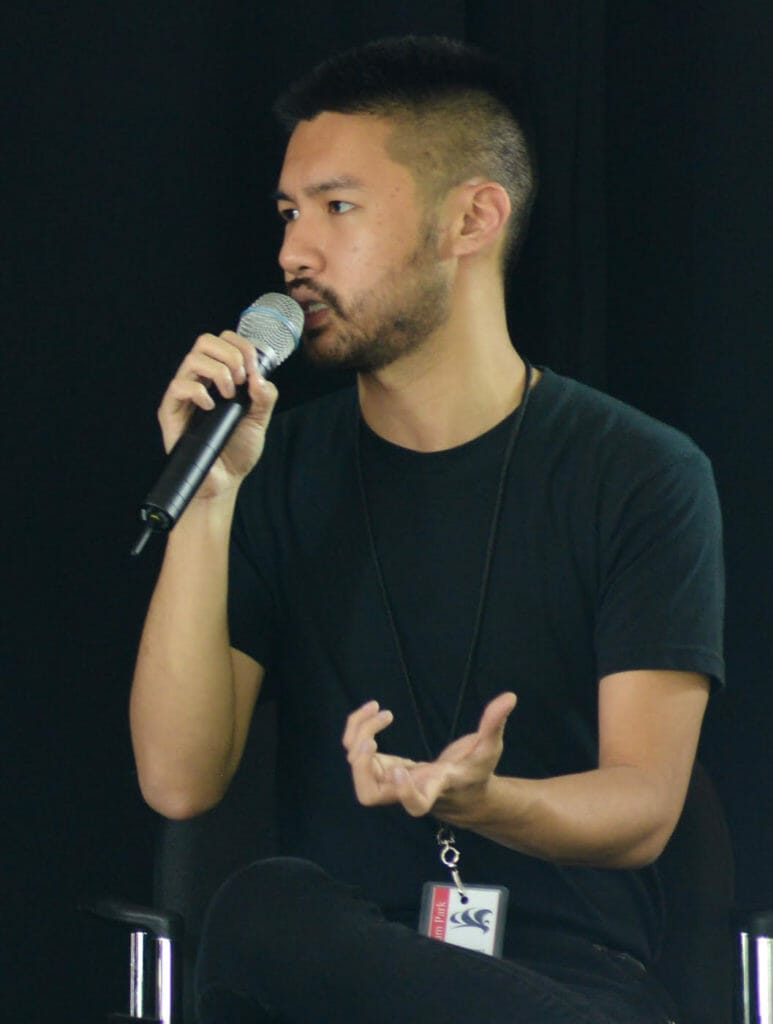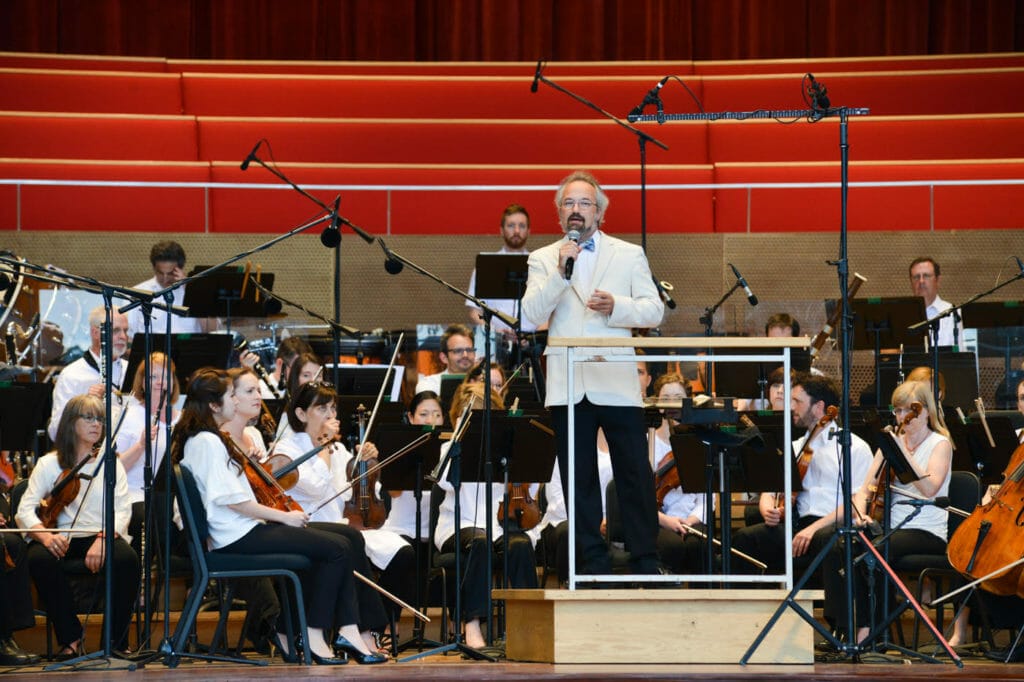In white tux and bow tie, Grant Park Orchestra conductor Carlos Kalmar began the night’s performance with reflections on how the Soviet Union impacted the arts. The former Soviet Union was not an easy place to be a composer,he said. The government closely monitored content and would pressure artists and suppress ideas believed contrary to the goals of the government. Many of the artists responded by simply minimizing their output. Not so for Khachaturian, a devotee of Communism his entire life, whose piano concerto we were to hear this night. This night also we would experience one of the 20th Century’s most enduring orchestral classics composed by Stravinsky (1882 – 1971), who fled the Communist system – The Firebird: Ballet.
Contemporary American riff on THE FIREBIRD opened the Grant Park Orchestra Festival concert
The high-energy opener snapped like a whip.
Fast-paced and urgent, this was INFERNAL (AFTER STRAVINSKY’S FIREBIRD), a six-minute piece by American composer David Schiff (b. 1945). This wind and percussion-heavy piece is freely based on a section of The Firebird Ballet entitled “The Infernal Dance of Kashchei’s Subjects.” We heard rock rhythms before it moved into a trombone solo in a swing mode, ending as urgently as it began. Highly entertaining and accessible, Infernal was a powerful and dramatic opening.
Illinois-born pianist Conrad Tao featured on Khachaturian’s 1935 PIANO CONCERTO
There are likely to be few who would fail to recognize this composer’s “Sabre Dance” – a staple of figure skaters and circus acts since it was first performed in 1942. This Piano Concerto was Khachaturian’s first major orchestral work and it established the Soviet-Armenian composer’s reputation as one of the Soviet Union’s major composers.
Bouncing on to the stage like a sprinter, black-clad solo pianist came Conrad Tao, a 23-year-old composer and pianist born in Urbana, Illinois, who studied in Chicago and is now based in New York City. His stride announced the athleticism he would soon bring to the keyboard.
This work weaved lively rhythms and unpredictable scales with sections that allowed Tao to also show his exceptional emotional and expressive ability. How interesting to also hear what sounded like a musical saw in the concerto’s middle section, where an instrument called a “Flexatone,” was used by the composer to create a melancholy mood. There were several cadenzas in this piece where Tao’s incredible range and jazz-like sense of immediacy came to the fore. At times he would bounce from his bench and at other times hunker down on the keys, until the final majestic and hopeful finale.
After his bows and leaving the stage with Conductor Kalmar, Tao unexpectedly came back with long strides and grabbed the microphone. He then introduced his own encore, reminding that it was Pride Weekend and of the shameful times when the arts were decimated by politicians’ refusal to address the early AIDS epidemic. He dedicated his delicate and heartful solo of Domenico Scarlatti’s Sonata in A Major, K 208 to Scott Ross, a harpsichordist who died of complications from AIDS in 1989 and was an expert in the works of Scarlatti (1865-1757).
Stravinsky’s THE FIREBIRD was fluid and electric in Kalmar’s interpretation
After intermission came Stravinsky’s Firebird Ballet. Kalmar took the microphone to share how this work catapulted the 20-something Stravinsky to fame overnight, much as Khachaturian's Piano Concerto did the same for him.
This is music that you can see as the ballet score it was for Serge Diaghilev’s famed Ballet Russe. Harsh and dissonant sections—that had inspired the Inferno opening by Schiff—later settled into the general feeling is a of a bucolic and restful mood.
Kalmar and the Grant Park Orchestra delivered a sensitive performance that capped a lovely and not-too-cool night at the Jay Pritzker Pavilion in Grant Park. It reminded why Stravinsky—along with Dimitri Shostakovich, Nicolai Korsakov and Sergei Prokofiev— is widely hailed as one of the 20th Century’s great Soviet orchestral composers.
This was a program best for lovers of 20th Century classical orchestral music, of which this writer is one.






